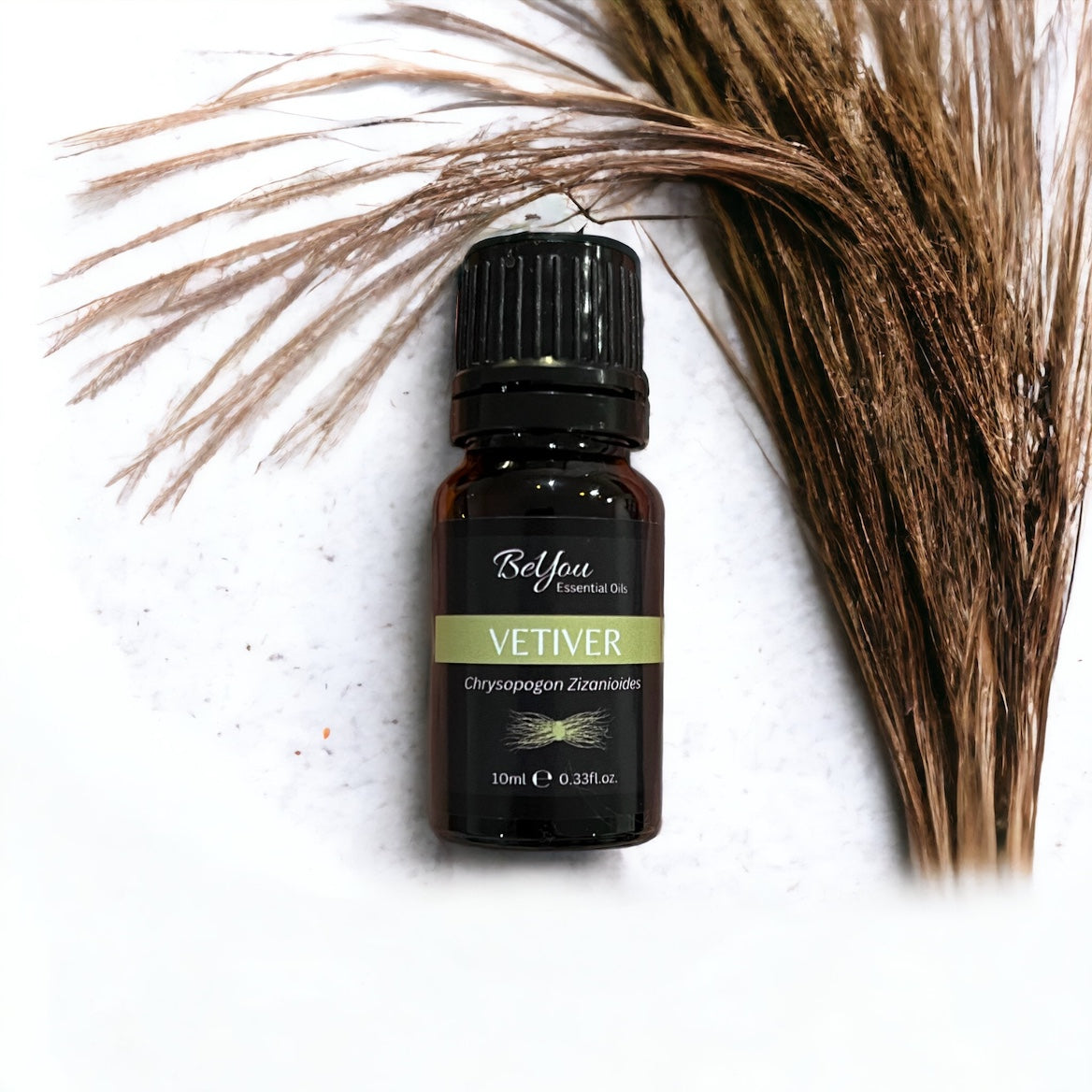Vetiver Pure Essential Oil
Vetiver Pure Essential Oil
Low stock: 3 left
Couldn't load pickup availability
DESCRIPTION
DESCRIPTION
Vetiver Essential Oil, derived from the roots of the Vetiveria zizanioides plant, is a deeply grounding and soothing oil with a rich, earthy aroma. Highly valued in aromatherapy, Vetiver oil offers a range of benefits for both the mind and body. Here are some details on its benefits and how to use it:
BENEFITS:
- Relaxation and stress relief: Vetiver oil is renowned for its calming and grounding properties. It can help reduce feelings of anxiety, nervousness, and restlessness, promoting a sense of relaxation and tranquility.
- Sleep support: Due to its sedative properties, Vetiver oil is often used to promote a restful night's sleep. It can help calm an overactive mind and improve the quality of sleep.
- Emotional balance: Vetiver oil has a balancing effect on emotions, making it useful in managing mood swings and promoting emotional stability. It is often used during meditation or times of emotional stress.
- Skin care: Vetiver oil has skincare benefits and can be beneficial for promoting a clear and healthy complexion. It has soothing properties that can help reduce the appearance of blemishes and improve overall skin texture. It possesses moisturizing and rejuvenating properties, making it beneficial for dry and aging skin. Vetiver oil can be added to skincare formulations or used in diluted form as a spot treatment.
PRODUCT DETAILS
PRODUCT DETAILS
Botanical Name: Vetiveria zizanioides (Vetiver) Oil
Derived from: Roots
Origin: India
Extraction: Steam Distilled Essential Oil
Note: Base note
Aroma: Sweet, smokey and resinous, earthy, woody, grounding
- Vegan
- Non-GMO
- Not tested on animals
- Halal
- No carrier oils, 100% pure essential oil
Size: 10ml
DIRECTIONS FOR USE
DIRECTIONS FOR USE
HOW TO USE:
- Diffusion: Add 4-8 drops of vetiver essential oil to a diffuser filled with water according to the manufacturer's instructions. Turn on the diffuser and let it disperse the aromatic vapor throughout the room. This method allows you to enjoy the grounding and calming properties of vetiver oil.
- Topical application: Dilute vetiver essential oil in a carrier oil, such as jojoba oil or coconut oil, at a 2-5% dilution. Apply the diluted oil to the desired area and gently massage it into the skin. This method is suitable for promoting relaxation and skincare benefits.
- Inhalation: You can inhale Vetiver essential oil directly from the bottle or by placing a few drops on a tissue or cotton ball. This method can help calm the mind, reduce stress, and promote emotional stability.
- Bath: Add a few drops of Vetiver essential oil to a warm bath. Mix well to disperse the oil and enjoy a relaxing and grounding bath experience. The aromatic properties of Vetiver oil can help promote relaxation and emotional balance.
BLENDS WITH
BLENDS WITH
BLENDS WELL WITH:
Vetiver Essential Oil blends well with various other essential oils, including:
- Lavender: for a soothing and relaxing blend.
- Bergamot: for a refreshing and uplifting aroma.
- Patchouli: for a deep and grounding combination.
- Ylang Ylang: for a sensual and floral fragrance.
- Sandalwood: for a harmonizing and meditative blend.
SAFETY PRECAUTION
SAFETY PRECAUTION
SAFETY PRECAUTIONS:
- Conduct a patch test before using Vetiver oil topically to check for any skin sensitivities or allergies.
- Vetiver oil is generally considered safe for most individuals. However, it is recommended to use in moderation and follow proper dilution guidelines.
- Avoid using Vetiver oil during pregnancy or if you have any specific health concerns, without consulting a qualified healthcare professional or aromatherapist.
- Keep Vetiver essential oil out of reach of children and pets.
- Store the oil in a cool, dry place, away from direct sunlight.

FAQs
-
What are essential oils?
Essential oils are highly concentrated plant extracts that capture the natural fragrance and beneficial properties of plants. They are typically obtained through processes like steam distillation or cold-pressing of various plant parts such as leaves, flowers, stems, or roots. Essential oils are known for their aromatic qualities and are commonly used in aromatherapy, personal care products, and natural remedies. -
How are essential oils used?
Essential oils can be used in several ways. Here are a few common methods:
- Aromatherapy: Inhalation of essential oils using diffusers, steam inhalation, or adding a few drops to a bowl of hot water.
- Topical application: Diluting essential oils with carrier oils (such as coconut or jojoba oil) and applying them to the skin for massage or skincare purposes.
- Internal consumption: Some essential oils are safe for internal use, but it is crucial to consult a qualified professional before ingesting them, as not all oils are suitable for internal consumption.
-
What are the potential benefits of essential oils?
Essential oils are believed to offer a range of potential benefits, but it's important to note that scientific research on their effectiveness is still evolving. Some commonly cited benefits include:
- Aromatherapy for relaxation, stress relief, and mood enhancement.
- Skin and hair care: Many essential oils are used in skincare products for their potential antimicrobial, anti-inflammatory, and soothing properties.
- Natural cleaning: Some essential oils possess antimicrobial properties and can be used as natural alternatives for household cleaning products.
- Potential respiratory support: Certain essential oils, such as eucalyptus or peppermint, are known for their potential respiratory benefits when inhaled.
-
Are there any risks or precautions associated with essential oils?
While essential oils are generally safe when used properly, there are a few important considerations:
- Skin sensitivity: Some essential oils can cause skin irritation or allergic reactions, especially when used undiluted or on sensitive skin. Always perform a patch test and dilute oils before applying them topically.
- Inhalation precautions: Not all essential oils are safe for inhalation, especially for individuals with respiratory conditions or sensitivities. Certain oils may trigger allergies or respiratory distress.
- Internal use: Internal consumption of essential oils should only be done under the guidance of a qualified professional. Many oils are toxic when ingested, and improper use can lead to adverse effects.
- Pregnancy and children: Some essential oils are not safe for use during pregnancy or on young children. It's crucial to consult healthcare professionals or certified aromatherapists for guidance in these situations.
Remember, it's always wise to consult with a healthcare professional or aromatherapist before using essential oils, especially if you have any underlying health conditions or concerns.
5. What is your extraction/collection process?
Refer to our Blogs for a detailed explanation about our Extraction and Collection process.
6. Are the plants sprayed with any chemicals which may lead to being included in the process of collecting the oil?
No, as our suppliers are certified there is no chemicals or pesticides being used on the plants, which are confirmed as each batch is analysed by microbiologist for the presents of bio-hazardous micro-organisms (such as bacteria and mould), heavy metals and pesticides.
7. Are the oils 100% organic as well as not diluted with fragrances or anything other than the plant itself?
Yes, all our Essential and Absolute oils are 100% organic, pure, with no carrier oils added, or fragrances.



